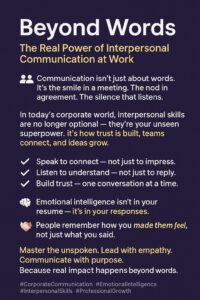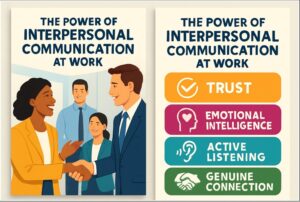Imagine walking into a room full of professionals. No one’s speaking, but the air is full of communication, a reassuring smile, a confident handshake, a furrowed brow.
This is interpersonal communication: the invisible thread that binds teams, builds trust, and drives collaboration.
In today’s corporate world, where roles are evolving and human connection matters more than ever, interpersonal communication isn’t a “nice-to-have” it’s a necessity.

Why Interpersonal Skills Are Your Unseen Superpower
Let’s be real: resumes get you interviews, but it’s your relationships that build your legacy. What sets top professionals apart isn’t just what they do, but how they engage with the people around them. Interpersonal communication is more than just exchanging information. It’s a blend of empathy, timing, and respect.Whether you’re presenting an idea, settling a disagreement, or simply checking in on a teammate, the way you connect can open doors, smooth rough days, and inspire trust.
- Great communicators aren’t just heard, they’re remembered, because they leave people feeling understood.
- In a workplace full of diversity and distance, interpersonal skills bridge gaps that emails never could.
Trust Is Built in Conversations, Not Contracts
In any professional relationship, trust is the foundation. And trust isn’t built through policies or processes, it’s built through consistent, respectful communication.
Professionals who actively listen instead of waiting to speak, who validate others’ perspectives, and who respond instead of reacting, naturally create safe and productive workspaces. These individuals become go-to colleagues, empathetic leaders, and dependable team players.
Don’t underestimate the impact of a simple gesture: using someone’s name, offering a heartfelt “thank you,” or being fully present (no phones, no distractions). These small acts are the building blocks of strong relationships, while dismissive glances or missed connections slowly wear trust thin.
What You Say Isn’t Always What People Hear
Ever notice how, sometimes, words don’t match the message? Someone says, “I’m good,” but their slumped shoulders say otherwise. At work, our actions, posture, tone, facial expressions speak volumes. A steady handshake or genuine laugh can invite openness, while crossed arms or wandering eyes might close the door on conversation.
Those who tune into these non-verbal cues see beyond the surface. They adapt, reassure, and build connections that run deeper than words.

When Emotional Intelligence Steps Up
Here’s the magic: Interpersonal communication is where emotional intelligence becomes visible. People with high EQ know when to listen, when to ask, when to pause. They understand the difference between honesty and harshness, and they’re masters at steering tough conversations towards understanding not just agreement. When stress levels rise and deadlines loom, it’s this calm, respectful way of connecting that turns colleagues into allies and leaders into mentors.
Conclusion: Speak to Connect, Not Just to Impress
Interpersonal communication isn’t about sounding smart, it’s about being human.
In a noisy corporate world full of presentations, pitches, and meetings, people remember those who made them feel heard, seen, and understood. Professionals who invest in their communication skills don’t just build careers they build influence.
So next time you’re about to hit send or speak up in a meeting, pause and ask: Am I just adding to the noise, or am I truly connecting?





Leave a Reply